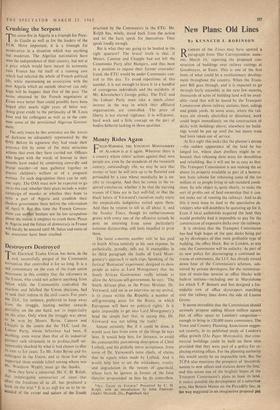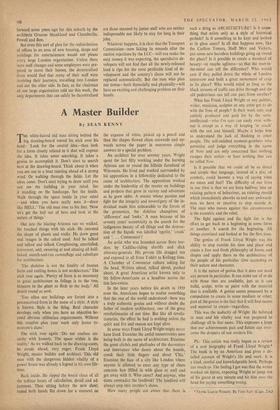New Plans: Old Lines
By KENNETH J. ROBINSON
RFADERS of the Times may have spotted a paragraph from 'Our Correspondent, BARK- ING, March 14,' reporting the proposed con- struction of buildings over railway cuttings at Goodmayes, in Essex. This is one of the first hints of what could be a revolutionary develop- ment throughout the'country. When the Trans- port Bill goes through, and it is expected to go through fairly smoothly in the next few months, thousands of acres of building land will be avail- able—land that will be leased by the Transport Commission above railway stations, lines, sidings and goods yards. In some areas, where the rail. ways are already electrified or dieselised, work could begin immediately on the construction of decks 'with buildings above; elsewhere no build• ings would be put up until the last steam train had been taken out of service.
At first sight this looks like the planner's dream —the sudden appearance of the land he has longed for, where slum dwellers might be re• housed, thus releasing slum areas for demolition and rebuilding. But it will not be as easy as that. The Transport Commission is not making the air above its property available as part of a benevo. lent State scheme for rehousing some of the ten million or so people living in sub-standard condi- tions. Its sole object is, quite clearly, to make the sort of profits out of land ownership that it can- not make out of running the railways. And to do this it must lease its land to the speculative de• velopers who will doubtless be queueing up for it. Even if local authorities acquired the land they would probably find it impossible to pay for the construction of expensive decks over the railway&
It is obvious that the Transport Commission has had high hopes of the spec decks being put up by developers of that most profitable type of building, the office block. But in London, at any rate, the Commission will be unlucky. As part of its new policy for discouraging a continued in- crease of commuters, the LCC has already turned down four of the Commission's schemes, sub- mitted by private developers, for the reconstruc- tion of main-line termini as office blocks with built-in stations—including one at Marylebone for which T. P. Bennett and Son designed a for- midable row of office skyscrapers marching over the railway lines down the side of Lissom Grove. tseems ie
ems incredible that the Commission should
seriously propose adding fifteen million square feet of office space to London's congestion— enough to bring in 120,000 more commuters. The Town and Country Planning Association sugges- ted recently, in its published study of London's ollice growth (The Paper Metropolis), that com- mercial buildings could be built on these sites provided that they were part of a policy for re- placing existing offices. For the planning authority this would surely be an impossible task. But the TCPA also mentions the prospects of 'decentral- isation to new offices and stations down the line,' and this seems one of the brighter hopes of the Transport Commission's plans to lease its land. It makes possible the development of a suburban area, like Boston Manor on the Piccadilly line, in the way suggested in an imaginative proposal put forward some years ago for this suburb by the architects Graeme Shankland and Chamberlin, Powell and Bon.
But even this sort of plan for the redistribution of offices in an area of new housing, shops and buildings for entertainment would not please every large London organisation. Unless there were staff changes and some employees were pre- pared to move their homes, the decentralised firms would find that many of their staff were doubling their journeys, travelling into London and out the other side. In fact, as the chairman of one large organisation told me this week, the only departments that can safely be decentralised are those manned by junior staff who are neither indispensable nor likely to stay for long in their jobs.
Whatever happens, it is clear that the Transport Commission—now licking its wounds after the station rejections by the LCC—will not make the easy money it was expecting, the speculative de- velopers will not find that all the newly-released land is ripe for the most profitable kind of de- velopment and the country's slums will not be replaced automatically. But the men who plan our towns—both financially and physically—will have an exciting and challenging problem on their hands.



































 Previous page
Previous page